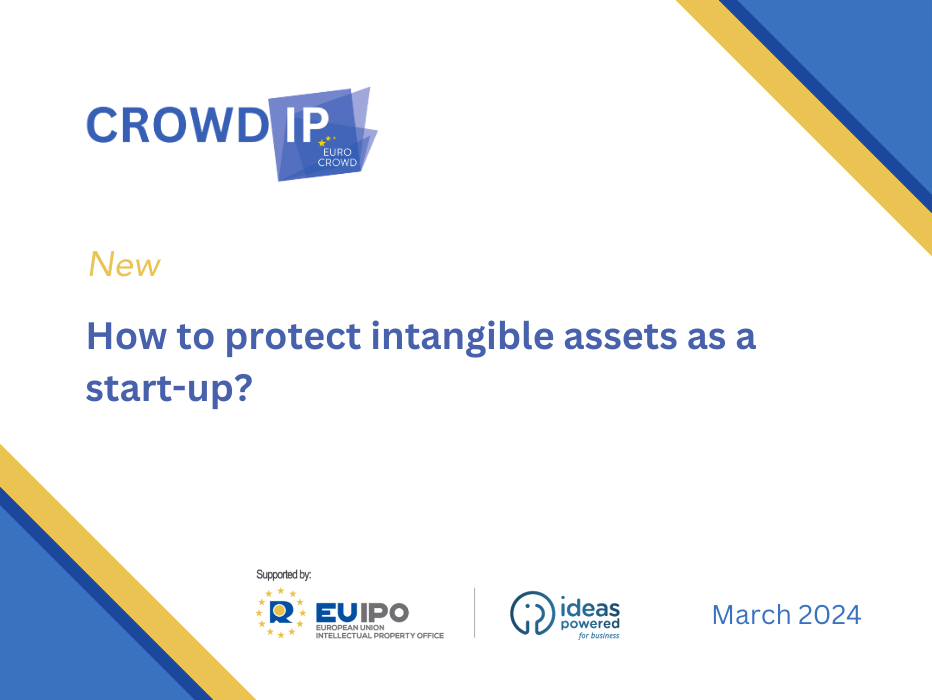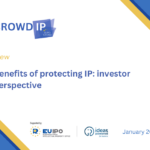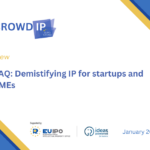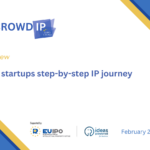CrowdIP
How to protect intangible assets as a start-up?

Protecting intangible assets is crucial for startups, as these assets often form the core of their competitive advantage. Some startups and other small and medium sized enterprises will in general only hold intangible assets. It is therefore important for these businesses to understand that intangible assets are very often worth protecting and that this protection can increase the value of the business. Here's a step-by-step guide on how a startup can protect its intangible assets:
Identify and Classify Intangible Assets: Clearly identify and classify your intangible assets. These may include intellectual property (patents, trademarks, copyrights), trade secrets, brand elements, customer lists, software, and more.
Conduct a Comprehensive IP Audit: Conduct an intellectual property (IP) audit to assess the scope and value of your intangible assets. This involves identifying what IP you have, its status, and its potential commercial value.
File for Intellectual Property Protection: Depending on the nature of your innovation, consider filing for intellectual property protection. This may include:
- Patents: Protect inventions and unique processes.
- Trademarks: Protect brand names, logos, and symbols.
- Copyrights: Protect original works of authorship.
- Trade Secrets: Implement measures to protect confidential information.
Implement Internal Controls: Put in place internal controls to safeguard your intangible assets. This includes restricting access to sensitive information, implementing confidentiality agreements, and training employees on the importance of protecting intellectual property.
Draft Clear Contracts: When working with employees, contractors, or collaborators, draft clear contracts that outline ownership and usage rights for intellectual property created during the course of the collaboration.
Use Non-Disclosure Agreements (NDAs): When discussing your startup's proprietary information with third parties, investors, or potential collaborators, use non-disclosure agreements to legally bind them to confidentiality.
Build a Strong Brand Strategy: Invest in building a strong brand strategy. Register trademarks for your brand elements and ensure consistent use to create brand recognition and value.
Monitor and Enforce Rights: Regularly monitor the market and industry for potential infringements on your intellectual property. Take prompt action to enforce your rights if any unauthorized use is identified.
Educate Employees: Educate your employees about the importance of protecting intangible assets. This includes training on how to handle sensitive information, recognising potential IP issues, and reporting concerns.
Secure Technology and Data: Implement robust cybersecurity measures to protect digital intangible assets, such as software code, databases, and customer information.
Create a Contingency Plan: Develop a contingency plan to address potential risks and challenges to your intangible assets. This may include a strategy for responding to IP disputes or adapting to changes in the competitive landscape.
Consider Insurance: Explore the possibility of obtaining intellectual property insurance to mitigate financial risks associated with IP disputes.
Engage Legal Counsel: Work with legal professionals specializing in intellectual property to ensure that your startup's intangible assets are adequately protected. Seek advice on registration, enforcement, and compliance matters.
Stay Informed About Regulatory Changes: Stay informed about changes in laws and regulations related to intellectual property in your industry and jurisdiction. Adapt your protection strategies accordingly.
Document and Record: Keep detailed records of your intangible assets, including creation dates, ownership details, and any changes in status. Documentation is essential in proving ownership and protecting against challenges.
By systematically addressing these steps, startups can create a robust framework for protecting their intangible assets, fostering innovation, and establishing a strong foundation for long-term success.
Disclaimer: The content provided by EUROCROWD in this post is intended for general informational purposes only. This information is not intended to constitute legal advice or provide bespoke solutions to specific problems. EUROCROWD endeavours to offer guidance to help individuals and businesses protect their intellectual property (IP). However, readers are expressly advised that the information presented should not be considered a substitute for professional advice or legal counsel. While we strive to ensure the accuracy and timeliness of the information shared, laws and regulations may change, and the content may not reflect the most current legal standards or interpretations. Your first step might be to visit EUIPO - Ideas Powered for Business: The European Union Intellectual Property Office (EUIPO) offers a platform called Ideas Powered for Business. It provides tools and resources for businesses to manage and protect their IP https://business.ideaspowered.eu



